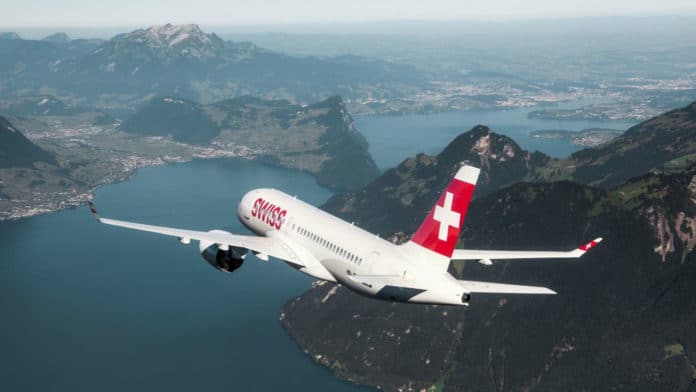Lufthansa Technik and BASF have developed AeroSHARK, a durable bionic film that successfully mimics the fine structure of sharks’ skin and optimizes the airflow, thus enabling significant savings in fuel and carbon dioxide emissions. According to the developers, just by using their sharkskin technology, the global fleet of long-haul aircraft could save close to five million tons of kerosene per year.
The skin of fast-swimming sharks exhibits a riblet structure aligned in the direction of flow that could be a promising way to reduce turbulent skin friction drag. Drag reduction by ribbed surfaces is a potentially effective strategy for reducing the energy consumption of ships.
Sized in patches for easy and targeted application, the AeroSHARK film features millions of these prism-shaped riblets, each one 50 micrometers high. Applied to the aircraft in a specific manner and aligned with the airflow, the riblets achieve efficiency gains by reduced friction, similar to those of their counterparts in nature, and can also improve lift if attached on wings.
International airline Swiss has calculated that applying a total of 950 square meters of AeroSHARK riblet film to the fuselage and engine nacelle surfaces of a Boeing 777 could reduce the fuel consumption by some 1.1%. Swiss plans to apply the innovative riblet film to twelve of its Boeing 777-300ER aircraft. This will reduce its annual fuel consumption by over 4,800 tonnes and the total annual carbon dioxide emissions by up to 15,200 tonnes.
Previously, Lufthansa Technik announced that the AeroSHARK film would be rolled out on its entire Boeing 777F cargo freighter fleet of ten aircraft that will save around 3,700 tons of kerosene per year and just under 11,700 tons of CO2 emissions. The company estimates the savings for the cargo planes to be even higher because the application areas are even larger in this case due to the absence of window rows on a freighter.
The AeroSHARK riblet film was tested in the laboratory and real flight conditions with more than 1,500 flight hours. Initial results for the Boeing 747-400 with a lower fuselage modification showed a 0.8% friction reduction from the effect of AeroSHARK. The riblet film is easy to apply to any aircraft and extremely resilient to UV radiation, water, oil, and large temperature and pressure shifts.
Lufthansa Technik and BASF intend to continue developing the new technology consistently to include additional aircraft types and even larger surfaces so that they can support airlines around the globe even more comprehensively in the future in reaching their sustainability goals.
Swiss will successively install the new AeroSHARK riblet film on its Boeing 777 fleet from mid-2022 onwards, making the aircraft more economical and reducing emissions.
